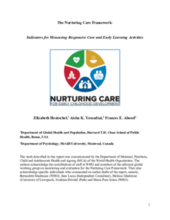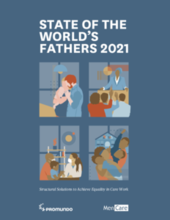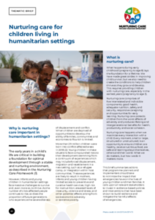Displaying 21 - 30 of 485
Two new indicators for the Monitoring and Evaluation Framework of the Nurturing Care Framework (NCF) have been developed in support of programme implementation. These indicators need to be validated before they can be recommended widely. Read the report to learn more about the proposed indicators.
First Years First Priority is a Europe-wide campaign set up to advocate for prioritization of early childhood development in public policies, with a particular focus on families and children who are at greater risk of discrimination and exclusion. This briefing provides a description of the policy context in which the 'First Year, First Priority' campaign is launched.
This workshop draws upon content from the Nurturing Care Framework, the Science of Early Child Development and the Beginning of Life film, to walk participants through why investing in early childhood is so important, including scientific and economic evidence.
This handbook is part of a set of resources for implementing the Nurturing Care Framework.
The State of the World’s Fathers 2021 report – the fourth in the series – presents research on care work during the COVID-19 pandemic, focusing on structural barriers that prevent equitable distribution of caregiving between women and men.
This course is a resource for parents or those who work with parents of young children to support them to provide brain-building experiences and nurturing care.
This brief summarizes actions that programme planners and implementers should take to minimize the impact that emergencies have on the lives of young children and their families.
This webinar highlighted how children with developmental delays and disabilities can have the best chance to not only survive, but also thrive. The webinar delved into the challenges, emerging research from Kenya, and practical country examples from Mozambique, Tajikistan and Peru.
This study examines the effect of an innovative caregiver education program in China on caregivers' perceived increase of parenting knowledge.
In this paper, the authors present the evidence on why childcare matters for building human capital, look at the current status of childcare provision worldwide, including an estimate of the global gaps in access, and present specific actions countries can take to expand access to quality, affordable childcare for all families that need it, especially the most vulnerable.





